Oh Lord, my God
When I, in awesome wonder
Consider all the worlds Thy hands have made
I see the stars, I hear the rolling thunder
Thy power throughout the universe displayed
Then sings my soul, my Savior God to Thee
How great Thou art, how great Thou art
Then sings my soul, my Savior God to Thee
How great Thou art, how great Thou art
— Carl Boberg, 1886
This is the place, I remember thinking. Not this island that pokes out of the north Pacific, or this rainforest stream slicing through the Sitka spruce and the hemlock. No. It has to be this exact bend in this exact creek. Right here is the place. Here, below a massive, almost-impassable log jam and above a deep, swirling eddy, where the creek makes a hard turn and then glides to the sea, is where my ashes belong when I’ve up and left my earthly vessel. There’s a subtle gravel bar that’ll work — just open the urn and spill me out. In time, the rain will wash me into the water and my powdery leave-behinds will mingle with the tannic water of this Tongass National Forest stream and drift into the open ocean.
I showed my daughter this little bend in the creek a decade or so ago, which was about a decade or so after I decided that this is where I’d end up. We traveled to Alaska together in celebration of her 16th birthday, and we toted along a special package. Tucked into my duffle were the ashes of my first real fishing dog, a long-lived rescue mutt that I freed from a chain tied to a water hydrant outside of Glenwood Springs, Colo., on Christmas Eve 1993. Spooner lived to be almost 17, and his passion was my passion. Some dogs are birdy. Some bring sheep to heel. Others just sit around and look impossibly cute and, therefore, they possess some sort of value — even after they’ve puked up dinner and squatted on the living room rug. Spooner? He lived to go fishing. And so did I.
A couple of years after he left us, and after trying like hell to figure out where he’d actually want his earthly remains committed after a lifetime spent wandering the hidden trout streams of the Rockies from Colorado to Montana, I made a command decision. I decided that he’d get to go first, and that maybe, if I could settle on a spiritual story that worked for me and fit my definition of what eternity looks like before the line goes flat, he’ll be there waiting when I arrive. He’ll be young and vibrant. I’ll be young again, too, able to climb over that log jam and swing a bright orange Zonker into the run and really feel it when that first fat Dolly Varden grabs it and starts to shake its head. Spooner’s ears will perk up. I’ll wear an unintentional smile and I’ll say something totally predictable, like, “There he is,” and let out a little grunt, because getting to this place and casting to these fish … well, it’s hard.
My daughter and I carefully spread Spooner’s ashes on the gravel bar, just above the water line.
More Like This
And I share this not because I’m lathered up in spirituality. I’m too much of a dabbler to genuinely embrace something so gelatinous as religion. Instead, consider it a nod to what might come after, if anything. And, at least in part, a nod to what I’d like that to look like.
I suspect I’m not alone in that regard. For the better part of 20 years, since I lost my grandfather, I’ve happily imagined that he’s “up there” somewhere, walking a trout stream and endlessly casting over rising trout — his reward for being good and honest and forthright when he walked the earth. Is it too much to want the same?
Mortality
Over time, as I matured — albeit the process is still ongoing and subject to frequent 8th-grade bathroom-humor backsliding — and developed some sense of where I belonged on the Judeo-Christian spectrum, I began to attend the Episcopal church. It made sense, but not because I was suddenly a convert or that I’d found the “right path.” My wife at the time was a casual Episcopalian, as was her family. My side of the family had some Baptist and Methodist roots, but church wasn’t really a thing.
If I'd had the ability to be more introspective as a young journalist and later a zealous conservationist, and could be more thoughtful of what the hand of God might look like, I might have come to the realization that I wasn’t short on spirituality. In fact, I’d venture to say that I was steeped in it. Every time Old Spooner and I would wander into the mountains, first in Colorado and later in Idaho, I’d return replenished. Invigorated. Renewed. It was my communion. My “blood of Christ, the cup of salvation.” It was my hand touching the creation of God, or God as I knew God.
And, over the years, I communed with God’s handiwork a lot. Spooner, too. And communion was good.
And then, just over a decade ago, I got a phone call from my little brother. After months of working with doctors to diagnose a strange malady that had quickly robbed him of his balance and sapped him of his strength, he finally had an answer. He had ALS. The prognosis, given what the disease had already taken, was bleak. It took four years for him to wither away. It was a horrible, miserable death, and I watched it happen.
And, of course, my faith, such as it was, was deeply shaken. I remember at Brice’s funeral, trying to choke out a decent tribute to my brother and failing miserably. I was going to deliver a lesson in faith, and was going to make sure everyone knew that faith was a load of crap. How did I know this?
Years ago, in the late 1980s, my brother and I mowed lawns for extra cash. At 16, I drove a boxy Chevrolet Caprice Classic — the sedan’s sedan. Roomy. Dependable. One of the last great “American steel” cars. In the trunk, if we laid things out just so, we could fit a full-size lawn mower, a string trimmer and two cans of gas.
On the drive home from mowing lawns one sticky East Texas afternoon, we were rear-ended by a drunk driver as we waited in the east-bound turn lane to make a left off of Highway 80 into the artery that fed our neighborhood. In a split second, both of us were facing the ceiling of the sedan, the rear end of the vehicle now crushed like an accordion. We spun around and when the dust settled, we were facing west in the west-bound lane. In the trunk was a lawn mower, partially filled with gasoline, as well as a half-empty gas can. In the back seat, on the floor, another partially full can of gas was crushed, and spilling fuel from its cracked lid.
Miraculously, Brice and I walked away from the wreck. What probably should have been a full-on fireball that could have taken us both instantly never materialized. The drunk driver survived, too, as did his passenger, although his face hit the dash so hard that the entire bottom bridge of his mouth just fell out onto the steamy pavement as soon as he opened the passenger door and stepped out onto the highway in a boozy daze.
Years later, at Brice’s funeral, I was going to let everyone know that “God” could have taken Brice right then and there. It would have been painless and he would have been gone in an instant. But, instead, “God” chose to give him three more decades, and then slowly and painfully sap the life out of him over the course of four miserable years. I never delivered that speech, and not because I didn’t want to. I just couldn’t get it out. I couldn’t speak through the sobs and the sadness and utter grief that just swarms over a grown man’s body when he’s lost a brother and, just for good measure, his faith.
Faith was gone. Mortality, though, was strong.
How Great Thou Art
I’ve attended my share of funerals lately. I’ve lost my brother, and I’ve said goodbye to dear friends. People I love have lost grandparents, parents and husbands. My own parents are palpably mortal these days, and quick to remind me of that fact, of course.
Growing up largely non-religious — and, frankly, from what I can remember, almost entirely agnostic — the most significant commitment my parents ever asked me to make to a church was when I agreed to attend Greggton First Baptist two Sundays a month so I could play league basketball with my friends. That’s right, folks. In East Texas, the path to God starts at the free-throw line.
So, never having found a true religious home — and very rarely over my life have I ever really thought I needed one — the only church I tend to get these days is almost entirely at funerals. And, given my most-of-the-year location here in eastern Idaho, most of the funerals I attend are Mormon funerals.
Now, I’ve never considered the Church of Jesus Christ of Latter Day Saints to be a religious option for me — just as I’ve never thought of joining the Presbyterian Church or diving into Catholicism. But I live among Mormons, both those who actively practice, and those of the “jack” variety, who have essentially strayed, voluntarily, from the faith, but who, if you were to ask them, would likely still claim the church as theirs. So, forgive the ham-handed description I’m about to lay out for you about what waits for Mormons after they die, and my sincere apologies to my Mormon friends if I miss the mark and somehow offend. That is not my intent.
Mormon funerals are not final goodbyes. Sure, like any funeral governed by the dictates of a Christian denomination, they are sad and heartfelt gatherings, conducted to honor the dead who are going to be greatly missed by those they’ve left behind. But Mormons are big into the afterlife, and those who lead a wholesome, Godly existence here on earth are bound for celestial bliss. In other words, the better you are here, the greater the reward you’ll enjoy there, where you will be reunited with those who’ve gone before you and await those who come after you, all in a unique celestial kingdom.
It’s not an odd idea. Most Western religions (and maybe most faiths, period) embrace the same general notion, albeit perhaps not as colorfully or overtly as Mormons. So, as I attend more funerals as I grow older — a sad reality that we’ll all face, I suppose — I’ve come to understand that a Mormon funeral, at its heart, is a celebration. And I’ve yet to attend a Mormon funeral where perhaps the greatest celebratory hymn ever written isn’t sung in full-throated harmony by those in attendance.
I’m quite certain that when Swedish poet Carl Boberg penned his “O Great God” that later became the hymn “How Great Thou Art,” he didn’t envision the fast embrace of the words by the Mormon faith — the song is a staple hymn performed by the Mormon Tabernacle Choir. And I’m even more certain that he never knew the impact his words would have on a boorish and itinerant fly fisher who often finds himself on the verge of tears when faithful funeral congregants begin the beautiful chorus, “... then sings my soul, my savior God to thee.”
It would seem that, to replenish one’s faith, it helps to be around people who have faith to spare.
That trout stream in the sky
For the not-so-easily influenced, there are few pastimes that truly inspire spiritual realization. My little brother was perhaps the most knowledgeable Denver Broncos fan I ever knew (and, if there’s a silver lining to his passing, it’s that he missed much of the last futile decade of Broncos football). If he had his way, his ashes would be firmly pressed into the turf at Mile High Stadium (and I’m neither confirming nor denying that his remains were craftily deposited in that location, and most likely in the south end zone). His church, I’m quite certain, was on Sundays or the occasional Monday or Thursday — whenever the congregation met. And it’s tough to deny the spiritual contagion that washes over 77,000 people when times are good. But, with Brice, it didn’t matter. Good times. Not-so-good times. He was a Broncos fan and was never ashamed — he wasn’t an apologist. He was an evangelist in the Church of Mile High Football.
For me, that realization comes from water. At first, it was trout water. As I matriculated through the fly fishing craft, I eventually found spiritual amusement in the boreal lakes along the Canadian Shield where northern pike eat every fly like it’s their last meal, and then amid the azure flats of the Caribbean where fooling a bonefish is a feat, and fooling a permit is a monumental achievement. It’s hard not to find the “holy spirit” when your backing is zipping through your rod guides and something so strong and hearty is giving every last ounce of its will to survive right before your very eyes. It’s no wonder we fly fishers pick our favorite spots and boldly determine that “this is what Heaven must be like.”
And, well, if it’s Heaven, then sign me up.
My Heaven hasn’t changed in 20 years. While my faith has wavered and my spirituality has occasionally flagged, I knew when I laid eyes on that creek and spent a day plying its waters and laying hands on its Dolly Varden that grow big and fat on salmon eggs and salmon smolt, that this is where I’d end up. And while I’m bound by my earthly struggles, I’ll do my best to go back now and then, if for no other reason than to visit my old fishing dog and battle those massive, rainforest char.
But, as Boberg’s poem later reads, when the time comes to “take me home, what joy shall fill my heart. Then I shall bow, in humble adoration.”
Then sings my soul.




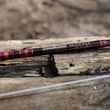

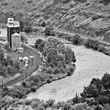
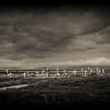
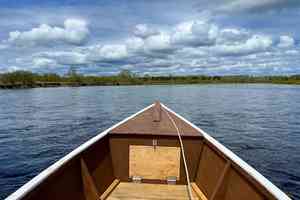




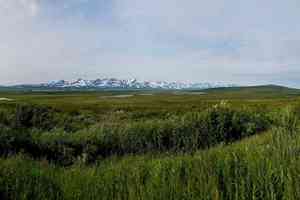

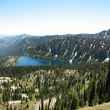

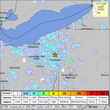









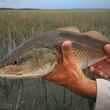
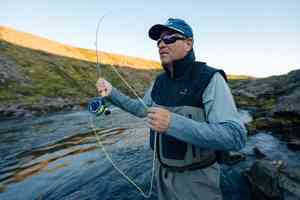




Comments
Steve Z replied on Permalink
This is my favorite hymn and you sing it beautifully. This is, perhaps, your finest writing. Thank you.
Anonymous replied on Permalink
Having lost 3 good fishing buddies the last 2 years has made me as reflective as you, with sad elegies of song or word re-playing right on the edge of my personal stream.
My personal favorite is “Just A Closer Walk with Thee” last heard at a southern Baptist funeral growing up. None of that for me, just a simple ash sprinkle on No Name Creek.
Dave B. replied on Permalink
"How Great Thou Art" is also one of my favorite hymns. The first verse that you quoted in the article is the most popular as it speaks to the wisdom, power, and greatness of God. But I am also humbled and amazed by the love of God that Boberg describes in the second verse:
"And when I think of God, His Son not sparing;
Sent Him to die, I scarce can take it in;
That on the Cross, my burden gladly bearing,
He bled and died to take away my sin."
R Robbins replied on Permalink
I think you must have been inspired to write such a beautiful column. So maybe there is a god.
Emil Turner replied on Permalink
In less than 12 months I officiated the funerals of my mother, my dad, and my wife. Just recently, my mother in law and a sister in law. If I had no hope of seeing them again, I'd just die myself. Not sure about a trout stream in the sky, but the original Conqueror of Death promised a prepared place. Good to know that each of my loved ones has a special place in His presence.
TC Thompson replied on Permalink
God is who he is, not who you want him to be. I understand your struggle with understanding. Good people dont deserve bad things that happen. But thats why its called faith.
Fishermans Prayer: God Grant that I may live to fish until my dying day, And when it comes to my last cast, I then most humbly pray; When in the Lord's safe landing net I'm peacefully asleep, That in His mercy I be judged as good enough to keep.
paul replied on Permalink
Very nicely done.
Having been raised in one of the more fervently conservative religions - in Texas - I heard and sang such hymns shortly after soft food replaced mother's milk.
With a jazz trumpeter father and a mom who was a superb vocalist, I could hardly escape the siren song of music. We sang a capella in our worship, and this hymn was one of our favorites. To join with several hundred voices in four-part harmony was - maybe - a sign that good would triumph in the end.
As I have aged - and I've got probably two decades on you - I have had the good fortune to fish in many wondrous waters, surrounded by the beauty of a creation Man could never conceive or construct. Aging alters perspective, of that I can attest. It appears you are also entering a more reflective time of life.
I am blessed that life has brought me the gift of music and of fly fishing. Life also brings loss, which in a way is also a gift, for it enriches our lives with the memories of people we have loved, songs we have sung, and places we have fished.
Thanks for your thoughts.
Anonymous replied on Permalink
An extraordinary reflection on the power of love, especially that of fishing for trout (and char) and in that process touching the hand of God. Those of us in our "third trimester" appreciate the beauty of truly living and most of us do not fear death, but only not living while here on earth. And so we should catch the trout, or bass, or bream or bonefish and be grateful for our blessings.
Pages